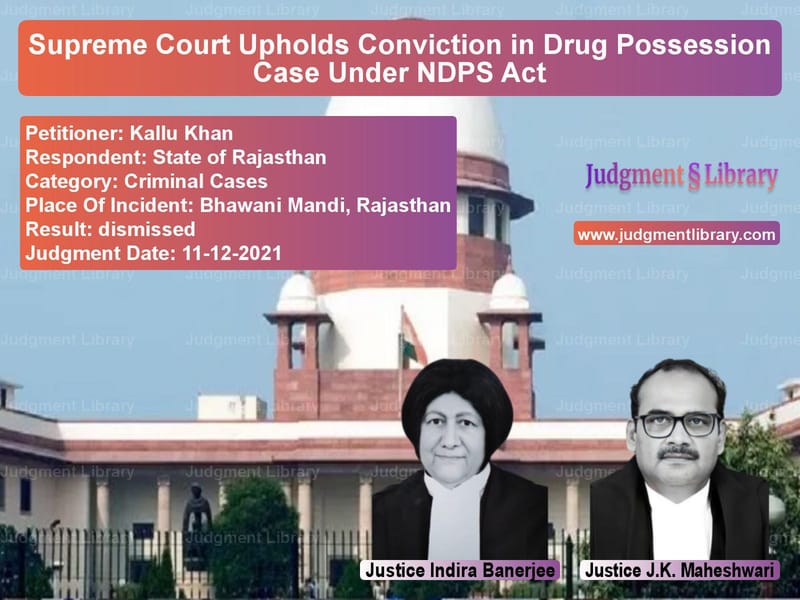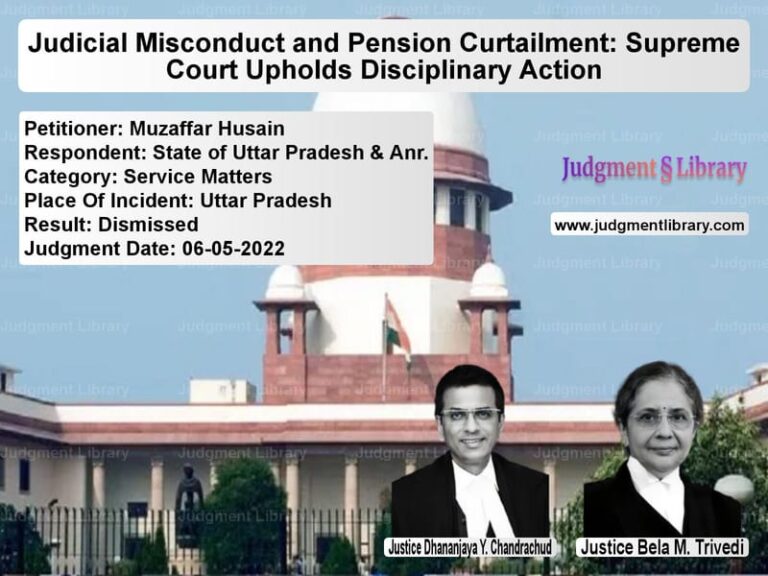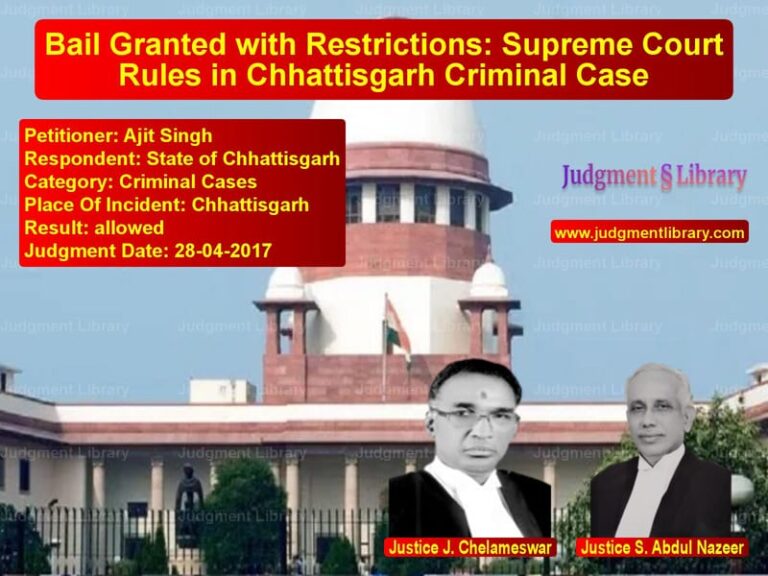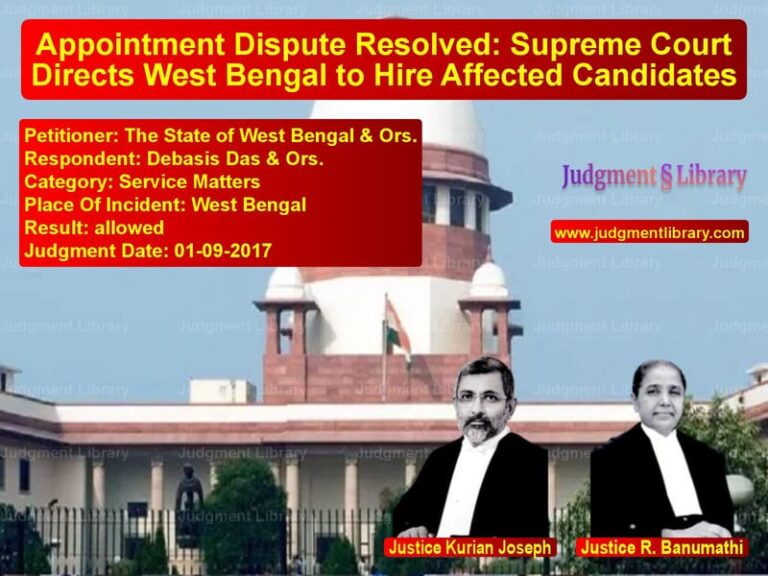Supreme Court Upholds Conviction in Drug Possession Case Under NDPS Act
The case of Kallu Khan vs. State of Rajasthan revolves around a drug possession and trafficking charge under the Narcotic Drugs and Psychotropic Substances (NDPS) Act, 1985. The Supreme Court upheld the conviction and sentence of the appellant, who was found in possession of 900 grams of smack. This judgment reaffirms the stringent legal framework governing drug-related offenses in India.
Background of the Case
On April 24, 2011, a police team led by Station In-Charge S.I. Pranveer Singh was on routine patrol in Bhawani Mandi, Rajasthan. During their rounds, they noticed the accused, Kallu Khan, riding an unregistered motorcycle. Upon spotting the police, the accused turned back and attempted to flee, prompting the officers to chase and apprehend him.
During questioning, Khan failed to provide a satisfactory explanation for his behavior. The police suspected foul play and, in the absence of independent witnesses, conducted a search in the presence of two police constables. They discovered a polythene bag containing a brown powder resembling smack concealed beneath the motorcycle’s seat. The substance was later confirmed as smack, weighing 900 grams.
The police registered a case under Sections 8 and 21 of the NDPS Act and presented the accused before the court. After a trial, the Special NDPS Court sentenced him to 10 years of rigorous imprisonment along with a fine of Rs. 1,00,000. In case of default in payment, he was to serve an additional one-year simple imprisonment.
Appeal Before the High Court
The accused challenged his conviction before the Rajasthan High Court on the following grounds:
- The police search was conducted without independent witnesses.
- The officer in charge was not authorized to conduct the search.
- There were contradictions in the testimonies of prosecution witnesses.
- The case relied solely on police witnesses, which could not be considered credible.
The High Court dismissed the appeal, holding that the prosecution had proven its case beyond a reasonable doubt. However, it reduced the default sentence for non-payment of the fine from two years to one year.
Appeal Before the Supreme Court
Not satisfied with the High Court’s ruling, the appellant approached the Supreme Court, reiterating his arguments regarding procedural lapses and improper handling of evidence.
Key Legal Issues
- Was the search and seizure conducted in compliance with the NDPS Act?
- Is the absence of independent witnesses sufficient to invalidate the conviction?
- Was the conviction solely based on police testimony reliable?
- Does the lack of personal possession affect the validity of the conviction?
Arguments Before the Supreme Court
Arguments by the Appellant
The appellant’s counsel contended that:
- The police conducted an unauthorized search and seizure, violating legal procedures.
- No independent witnesses were present, making the recovery suspect.
- The prosecution failed to prove that the motorcycle belonged to the accused.
- The contraband was not produced in court, raising questions about its handling.
Arguments by the State of Rajasthan
The prosecution countered that:
- The search was conducted under Section 43 of the NDPS Act, which allows for searches in public places.
- The police officers were competent to conduct the search and seize the contraband.
- The accused’s conduct—fleeing upon seeing the police—raised reasonable suspicion.
- Even if the vehicle did not belong to the accused, he was riding it at the time of the offense.
Supreme Court’s Analysis and Judgment
Validity of the Search and Seizure
The Supreme Court ruled that Section 50 of the NDPS Act, which mandates informing the accused of their right to be searched in the presence of a magistrate or gazetted officer, was not applicable in this case. Since the drugs were found in a vehicle rather than on the accused’s person, the procedure followed under Section 43 was deemed valid.
“In the case of a chance recovery from a vehicle in a public place, compliance with Section 50 is not mandatory.”
Reliability of Police Testimony
The Court emphasized that the absence of independent witnesses does not invalidate a case if the police testimonies are consistent and reliable. It cited Surinder Kumar vs. State of Punjab and Jarnail Singh vs. State of Punjab to reinforce the principle that police officers can be considered trustworthy witnesses in the absence of hostility or bias.
“Merely because independent witnesses were not examined, the conclusion could not be drawn that the accused was falsely implicated.”
Final Judgment
The Supreme Court upheld the conviction, stating:
- The prosecution had proven its case beyond a reasonable doubt.
- The conviction under Sections 8 and 21 of the NDPS Act was legally sound.
- The procedural safeguards under the NDPS Act were complied with.
- The accused had already served his 10-year sentence and paid the fine of Rs. 1 lakh.
- Since he had completed his sentence, no further directions were necessary.
Key Takeaways from the Judgment
- Search and seizure under Section 43 of the NDPS Act is valid for public places and vehicles.
- Absence of independent witnesses does not invalidate a case if police testimony is credible.
- Constructive possession applies even if the vehicle is not registered to the accused.
- Non-production of contraband in court is not fatal if forensic tests confirm the seized substance.
- Compliance with procedural safeguards under the NDPS Act is essential but must be interpreted practically.
Conclusion
The Supreme Court’s judgment in this case reaffirms the principles governing drug-related offenses under the NDPS Act. By upholding the conviction based on police testimony, constructive possession, and forensic evidence, the ruling strengthens the legal framework for drug enforcement while ensuring procedural compliance. This case serves as a crucial precedent for handling similar cases involving chance recoveries and public place seizures.
Petitioner Name: Kallu Khan.Respondent Name: State of Rajasthan.Judgment By: Justice Indira Banerjee, Justice J.K. Maheshwari.Place Of Incident: Bhawani Mandi, Rajasthan.Judgment Date: 11-12-2021.
Don’t miss out on the full details! Download the complete judgment in PDF format below and gain valuable insights instantly!
Download Judgment: kallu-khan-vs-state-of-rajasthan-supreme-court-of-india-judgment-dated-11-12-2021.pdf
Directly Download Judgment: Directly download this Judgment
See all petitions in Drug Possession Cases
See all petitions in Bail and Anticipatory Bail
See all petitions in Judgment by Indira Banerjee
See all petitions in Judgment by J.K. Maheshwari
See all petitions in dismissed
See all petitions in supreme court of India judgments December 2021
See all petitions in 2021 judgments
See all posts in Criminal Cases Category
See all allowed petitions in Criminal Cases Category
See all Dismissed petitions in Criminal Cases Category
See all partially allowed petitions in Criminal Cases Category







